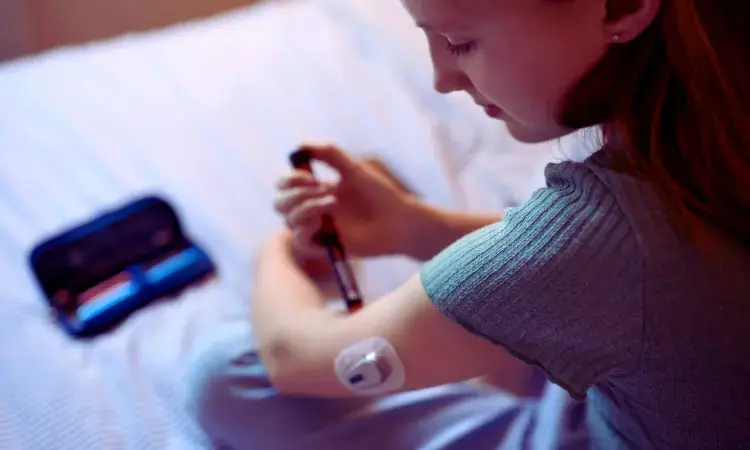- Home
- Medical news & Guidelines
- Anesthesiology
- Cardiology and CTVS
- Critical Care
- Dentistry
- Dermatology
- Diabetes and Endocrinology
- ENT
- Gastroenterology
- Medicine
- Nephrology
- Neurology
- Obstretics-Gynaecology
- Oncology
- Ophthalmology
- Orthopaedics
- Pediatrics-Neonatology
- Psychiatry
- Pulmonology
- Radiology
- Surgery
- Urology
- Laboratory Medicine
- Diet
- Nursing
- Paramedical
- Physiotherapy
- Health news
- Fact Check
- Bone Health Fact Check
- Brain Health Fact Check
- Cancer Related Fact Check
- Child Care Fact Check
- Dental and oral health fact check
- Diabetes and metabolic health fact check
- Diet and Nutrition Fact Check
- Eye and ENT Care Fact Check
- Fitness fact check
- Gut health fact check
- Heart health fact check
- Kidney health fact check
- Medical education fact check
- Men's health fact check
- Respiratory fact check
- Skin and hair care fact check
- Vaccine and Immunization fact check
- Women's health fact check
- AYUSH
- State News
- Andaman and Nicobar Islands
- Andhra Pradesh
- Arunachal Pradesh
- Assam
- Bihar
- Chandigarh
- Chattisgarh
- Dadra and Nagar Haveli
- Daman and Diu
- Delhi
- Goa
- Gujarat
- Haryana
- Himachal Pradesh
- Jammu & Kashmir
- Jharkhand
- Karnataka
- Kerala
- Ladakh
- Lakshadweep
- Madhya Pradesh
- Maharashtra
- Manipur
- Meghalaya
- Mizoram
- Nagaland
- Odisha
- Puducherry
- Punjab
- Rajasthan
- Sikkim
- Tamil Nadu
- Telangana
- Tripura
- Uttar Pradesh
- Uttrakhand
- West Bengal
- Medical Education
- Industry
Tight Glycemic Control Linked to Lower Mortality Risk in Type 2 Diabetes: Study Finds

China: A new study published in Diabetes, Obesity and Metabolism has highlighted the significant role of tight glycemic control in reducing long-term mortality risk for individuals with type 2 diabetes. The study involving 6,061 patients with type 2 diabetes (T2DM), monitored over an average of 10.9 years, found that maintaining a higher time in a tight glycemic range (TITR; 3.9–7.8 mmol/L or 70–140 mg/dL) can significantly lower mortality risk.
The researchers revealed that for every 10% decrease in TITR, there was a 4% increase in the risk of all-cause and cardiovascular mortality, even among patients with well-controlled HbA1c levels (<7.0%) and fasting glucose levels below 7.0 mmol/L.
Time in tight range refers to the percentage of time a person spends within their target blood glucose levels, which indicates effective glycemic control. Currently, there is limited evidence on the relationship between time in tight range (TITR) and long-term adverse outcomes. To address this gap, Jian Zhou, Shanghai Key Laboratory of Diabetes Mellitus, Shanghai, China, and colleagues aimed to investigate the association between TITR and the risk of both all-cause and cardiovascular mortality in patients with type 2 diabetes.
For this purpose, the researchers prospectively recruited 6,061 patients with type 2 diabetes from a single center. Time in tight range was measured using continuous glucose monitoring (CGM) at baseline, with TITR defined as the percentage of time spent within the target glucose range of 3.9–7.8 mmol/L (70–140 mg/dL) over 24 hours. The researchers employed Cox proportional hazard regression models to examine the association between TITR and the risk of all-cause and cardiovascular mortality.
The study led to the following findings:
- During a median follow-up period of 10.9 years, 31.3% of death events were confirmed, with 11.4% attributed to cardiovascular mortality.
- The restricted cubic spline analysis revealed significant linear relationships between lower TITR and higher risks of both all-cause and cardiovascular mortality.
- In the fully adjusted model, which included glycated hemoglobin A1c, each 10% decrease in TITR was associated with a 4% increase in the risk of all-cause mortality and a 4% increase in the risk of cardiovascular mortality.
- Subgroup analyses indicated that the linear relationship between TITR and all-cause mortality risk was consistent in patients with HbA1c <7.0% and those with fasting plasma glucose <7.0 mmol/L.
The study found a significant inverse relationship between time in tight range and the risk of both all-cause and cardiovascular mortality in patients with type 2 diabetes.
"The findings suggest that a tighter glucose target range could help reduce the risk of long-term adverse outcomes, particularly in individuals who appear to have well-controlled diabetes based on conventional glucose metrics. We emphasize the importance of considering TITR in managing diabetes to improve long-term health outcomes," the researchers concluded.
Reference:
Cai J, Liu J, Lu J, Ni J, Wang C, Chen L, Lu W, Zhu W, Xia T, Zhou J. Impact of time in tight range on all-cause and cardiovascular mortality in type 2 diabetes: A prospective cohort study. Diabetes Obes Metab. 2025 Jan 27. doi: 10.1111/dom.16212. Epub ahead of print. PMID: 39868655.
Dr Kamal Kant Kohli-MBBS, DTCD- a chest specialist with more than 30 years of practice and a flair for writing clinical articles, Dr Kamal Kant Kohli joined Medical Dialogues as a Chief Editor of Medical News. Besides writing articles, as an editor, he proofreads and verifies all the medical content published on Medical Dialogues including those coming from journals, studies,medical conferences,guidelines etc. Email: drkohli@medicaldialogues.in. Contact no. 011-43720751


